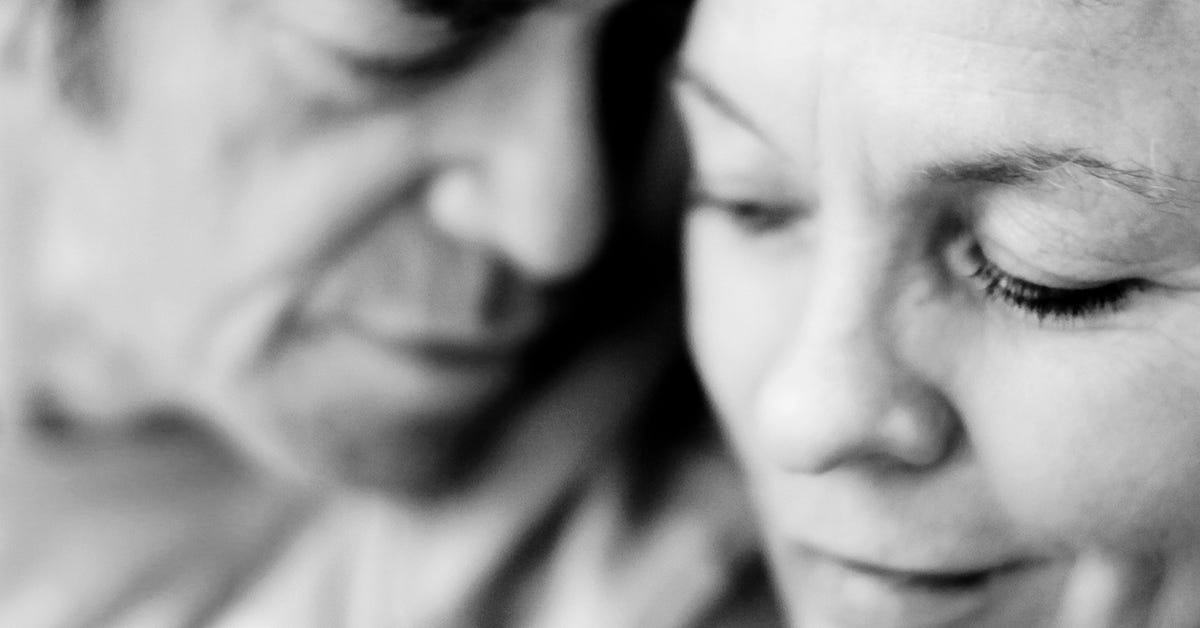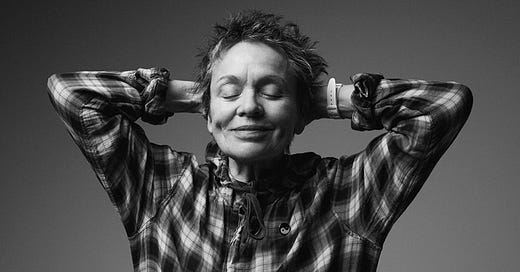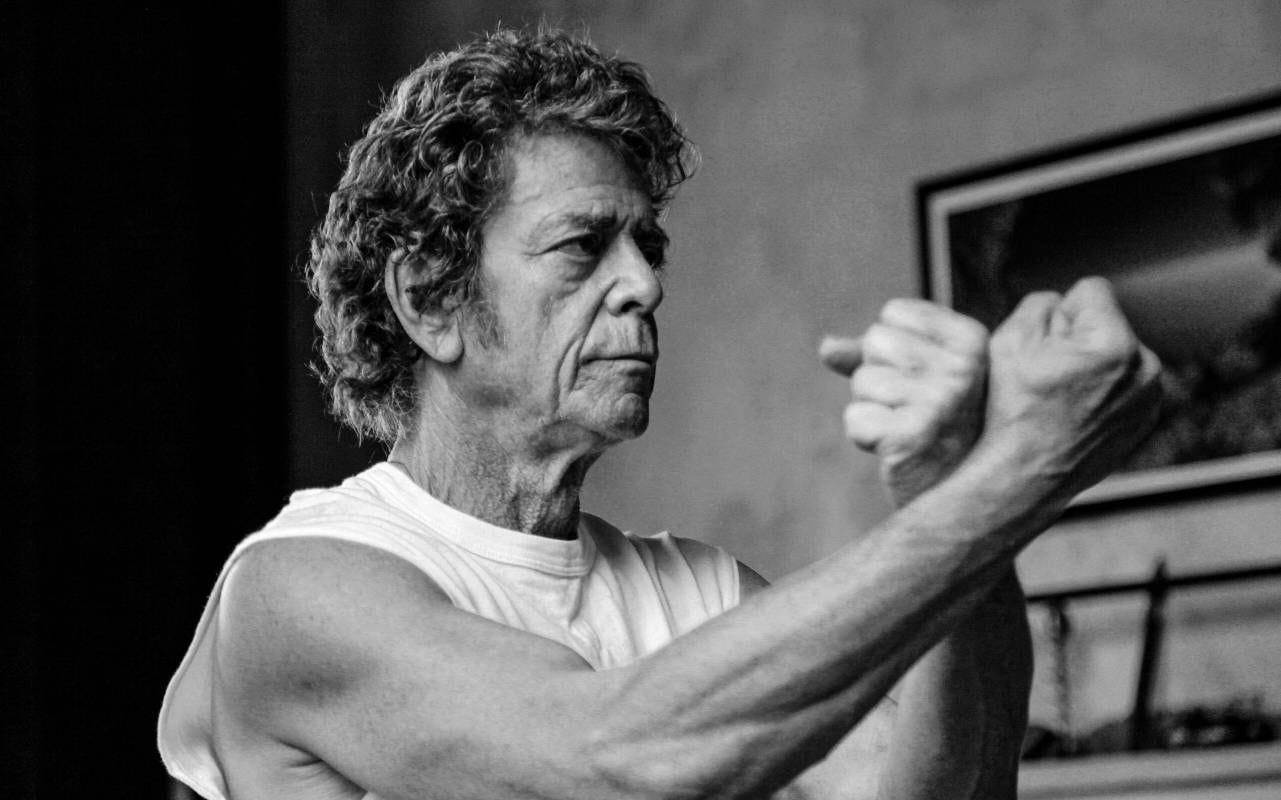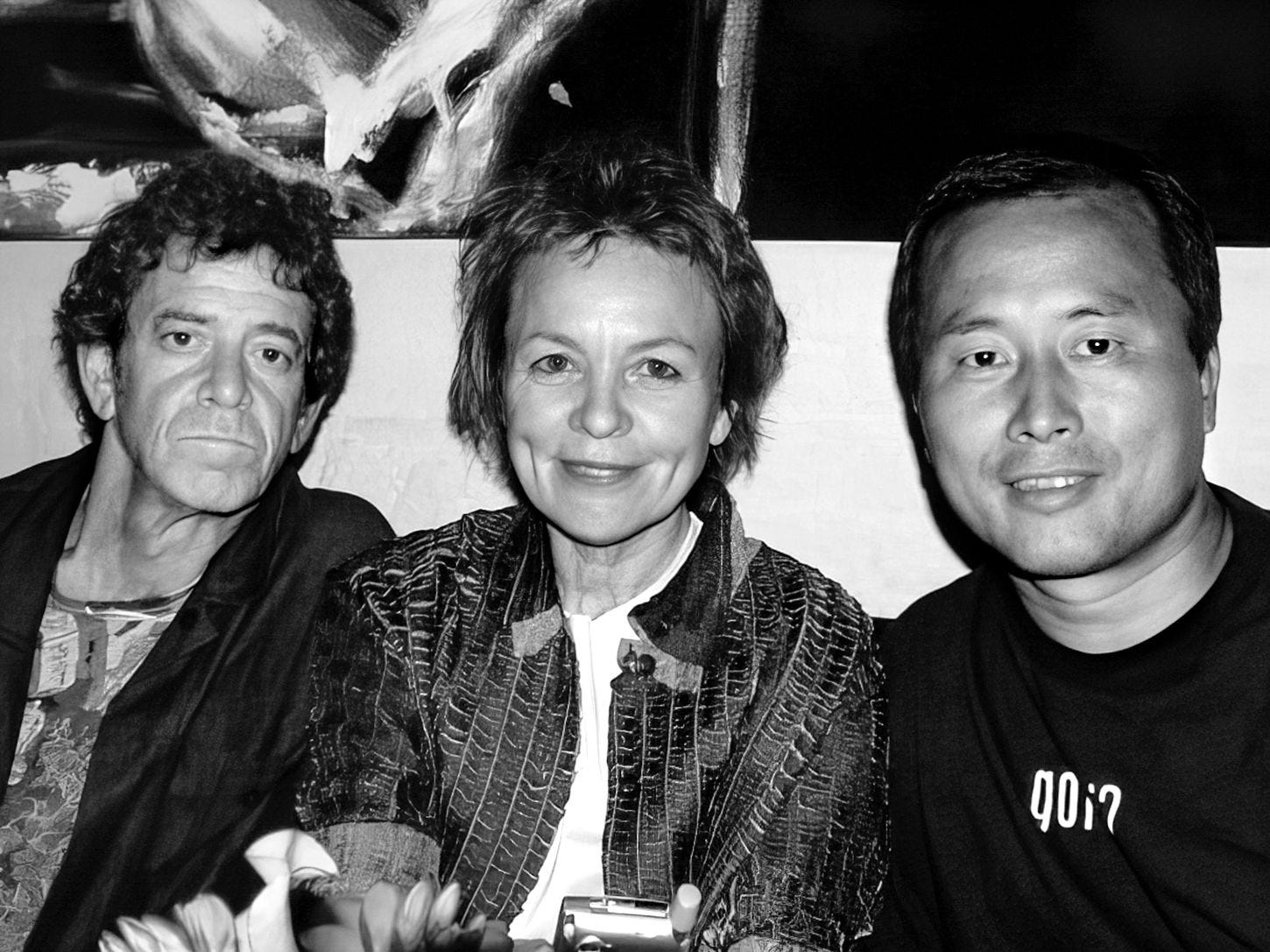Laurie Anderson talks Tai Chi, Aging and Barbie
A freewheeling interview with the legendary artist and co-editor of Lou Reed's "The Art of The Straight Line"
In 1984, Laurie Anderson and Lou Reed hadn’t even started dating yet, but they were already living together in my VCR. As a teen in Philly, without cable or MTV, I used to record music videos I liked, so I could watch them endlessly. On the same tape on which I’d recorded Laurie’s “Sharkey’s Day” from some PBS special, I’d also captured Lou Reed’s “I Love You Suzanne” from somewhere else. Who could have imagined that almost a decade later this icon of experimental art-pop would marry the godfather of underground rock. They were a fascinating yin and yang couple, one that demonstrated an amazing breadth of art and music within one household.
I’m going to guess anyone reading here probably already knows who they are, but for the sake of journalistic propriety: Laurie Anderson creates avant-garde art that’s both accessible and full of soul — from performance art to music to technology and film. (I watched her achingly beautiful film Heart of a Dog right before my dog had surgery and was a complete mess afterwards). The late, legendary Lou Reed became Laurie’s partner and creative collaborator in 1992. Founding member of the Velvet Underground, protege of Andy Warhol, streetwise poet, ferocious guitarist, he was also a guy who lived and breathed New York City. But in a new book credited to Lou Reed and co-edited by Laurie, The Art of The Straight Line: My Tai Chi, we learn about Lou’s passion for Tai Chi, how he was a “martial art nerd,” someone fixated on learning, and a seeker of magic. And as Laurie put it in her essay in the book, “Lou knew how to cry; it’s why I fell in love with him.”
In 2005, I had a not-so-serendipitous encounter with Reed in a Tai Chi class which I wrote about here. In short, a friend/ co-worker Scott Richman suggested I take a Tai Chi class and oh, Lou Reed happened to be one of his classmates, and, of course, I was IN, and well, you can read the rest. Looking back, it’s a slightly cringe-y story about me as, essentially, a celebrity stalker. So when my friend Scott, who also co-edited Art of the Straight Line, asked if I’d speak with Laurie about the book, I was beyond thrilled but also, like…are you sure? (He was sure.)
Something that I didn’t explore deeply in that Tai Chi class story, and something I’ve realized in hindsight, was how affected I was by the experience. I was a bumbling novice, but even my brief attempt gave me a glimmer of how mind-broadening this fluid and forceful martial art could be. All those memories came rushing back as I read The Art of the Straight Line, a rich collection of interviews with everyone from Iggy Pop to Julian Schnabel to author A.M. Homes to Lou’s teacher Master Ren sharing candid first-person memories of Reed.
On a Monday evening this August, Laurie called me as she was driving back to New York City, taking the Long Island Expressway from Springs in East Hampton. As many articles about her had suggested, Laurie was indeed easy to talk to and the conversation effortless. It didn’t feel much like an interview but more a chat with a thoughtful, inquisitive friend — who happens to be a genius. Listening to her quintessential, soothing voice, I noticed the way she says Lou’s name: Lou, with a soft, drifty curve on the U. Like “cooo.” It’s hard to describe, but when she says “Lou” it sounds like love.
What follows is a lightly-edited transcript of our conversation.
MARGIT: So… I don't know if [your publicist] mentioned that I took Master Ren’s Tai Chi class…
LAURIE: Oh, I read your little blurb about that. [laughs]
MARGIT: Uh oh. Oh dear. [laughs, nervously]
LAURIE: Did you ever do Tai Chi again after that?
MARGIT: Eventually I did a few more classes with him and I really enjoyed it. But life just sort of got in the way. I have to say that reading The Art of the Straight Line, and feeling the pain in my shoulder right now, I’m reinspired.
LAURIE: You’re also older. We were hoping to get college kids interested in this but, you know what, they’re not.
MARGIT: Why wouldn’t they be?
LAURIE: Nothing hurts. It’s too slow. We were trying to do a sort of college tour for the book, to appeal to college students with [Tai Chi] demos. A lot of colleges have huge mental health centers now, just because so many people are not feeling mentally good. There really is an epidemic of suicides, you know. Why is that, what’s your theory about that?
MARGIT: What’s my theory on suicide in young people?
LAURIE: Yeah. If you had to say a couple things, like what comes to mind?
MARGIT: Technology and isolation. Lack of true community. Everything is about the self and showing your life in a certain way and I think that really does tremendous damage to mental health. But what about you?
LAURIE: I would say loneliness and tech — and it’s a very poor substitute for hanging out with real people, you know, and actually seeing them and going out your door. If you don’t go out your door, things can get really weird. And the branding pressure is huge.
MARGIT: Absolutely. You have to be a certain way, look a certain way and have this whole marketing plan for your lifestyle.
LAURIE: I feel weirdly responsible, in terms of my own generation's contribution to that. When I started in with the commercial record company, [the company asked] ‘what’s your brand?’ And I, you know, I did it as a joke. I didn’t think it was me, but I did it anyway. I was like, oh, here’s an image you can use. But, I think people now identify with their brand. So when you think that your own self image is what other people think you are, it gets very, very mirror-like.
MARGIT: Speaking of mirrors, you talk in the book about hearing Tai Chi-like ideas in Lou’s music, lyrics like “I’ll be your mirror, reflect what you are.” You describe that as one of Lou’s most transcendent songs and “observing, understanding people were among his greatest skills.” So, in that Tai Chi class, when Lou was kind of moving me around and I wasn’t getting it, was he mirroring my …
LAURIE: He did the corrections for you. He put his hands on you. He does that to everybody — not that you weren’t special — but it’s a hands on kind of thing. And that shocks people sometimes because they’re like, whoa, don’t touch me, you know? But it’s a fighting form. You’re right to kind of feel a little beaten up, because it really has a lot of force to it.
One of Lou’s favorite things about working with Master Ren were the applications - they are the secret moves. What you’re actually doing when you hold your palm out like that, you’re decapitating someone. It’s not a nice, polite form of beautiful movement at all. It’s a ritual killing. So I think that really appealed to Lou and to a lot of guys. There were a lot of guys who just really threw each other around. Now it’s mostly women in Master Ren’s class who are really good.
MARGIT: How challenging was it to compile the book after Lou had passed?
LAURIE: The book took us years to put together; we’re all really proud of it. It was really fun to talk to all those people because they’re all our friends and it’s a very unique book about Lou because it’s people who knew him. None of the biographers knew Lou. Some of them claim that they were his friends but they were not.
We kind of dragged out the writing a little bit just so we could hang out more and we did wanna get it right. It’s the only account by people who knew Lou personally. And, many of them were really, as you can tell from the book, really grateful to him for pushing them [in Tai Chi] like that. And he did that with people. He would just see people and go, “What's wrong with your shoulder?” or “Why are you standing like that?”
He really wanted to help people. He genuinely did. Who does that? How many people do you know who do that? Like one or two, maybe?
MARGIT: Did you know Tai Chi before you met Lou or was it something that he introduced you to?
LAURIE: I started when I met Lou, in the mid-’90s with Leung Shum, a guy doing really acrobatic stuff. It was like going to the circus and I thought, I’m gonna kill myself if I just do this. Lou and one of his best friends were doing the class — they were older guys then and they couldn’t compete with these 16-year-old kids who would be jumping up into the middle of the air, like fish out of water, and spinning around and like [she makes a “boop” noise]. Then I really decided, you know, couples can’t do everything together. I’m gonna be wearing a matching outfit any minute.
MARGIT: Lou and Laurie in matching sweatsuits.
LAURIE: Exactly. So I asked around and somebody said this guy over on Lafayette [Street] is interesting. So I went to his class about three or four times and he was astounding.
I told Lou, “Listen, I hate to say this, but my teacher is better than yours.” He said, “Really?” And he went to see Master Ren and he immediately saw this is the real deal. This guy is not making it up. As soon as they got together it was sort of like a threesome so I had to like, fade off into the shrubbery.
And then when [Lou] died I got more into it and had more of a relationship with Master Ren. He really encourages women, you know, and that's pretty unusual too for any kind of martial arts person.
MARGIT: I found Master Ren very encouraging, joyful. He has a sort of twinkle in his eye.
LAURIE: Yes! You were there in what, 2004? It’s almost 20 years later. That he's still doing that. It… it's kind of crazy, like, and, and also can you imagine driving if you don't read English? How do you do that?
MARGIT: I don't know. I don't really even drive so…
LAURIE: Oh you don't? Wow.
MARGIT: Well, I know how, but living in New York…
LAURIE: You don’t have to.
MARGIT: Exactly… On another topic, you describe Tai Chi in the book as “moving through circles without losing the sense of direction.” And I feel like, to me, that’s also sort of the process of aging. Adapting, adjusting, but keeping your core beliefs in place. Do you agree?
LAURIE: I think Lou would. He definitely wanted to be a grand old man. He didn’t wanna be decrepit. And that’s always a good goal. In terms of what you’re saying about spirals, one of my meditation teachers talks about how learning is never in a straight line where you tick things off. You say, “I learned that, and then that.” But you come back and forth to [the material] and then you see it again, you know, three years later, you look down the spiral and go, oh, I remember when I first saw that and then you see it in a different way. So that was the very first thing that we, as editors, had to ask ourselves: Why is it called the Art of the Straight Line in a world of circles? We did feel that it was eventually sort of a kind of aspiration, that there is a kind of a true north somewhere.
MARGIT: And those are individual true norths, right? Everybody’s line is different.
LAURIE: Yes, everyone’s path is different but the teaching stays the same. You adapt to what you need and what you can understand and go as far as you wanna go. For some people Tai Chi is fine to just do as a kind of workout, and then for others it’s like Chinese brushwork, you know? There’s a woman in Ren’s class now who is a really wonderful calligrapher, she does some really high leaps and turns. And I feel when I see her I’m like, wow, it feels like she’s got a brush in her hand or something. It’s very, very graceful. It’s not like looking at a man doing it. It’s of course a whole different center of gravity in a woman's body than a man’s. Men’s force is often kind of around the heart and the chest and the arms, right? And women’s is lower down. That’s kind of never pointed out and I, you know, as, as the only female editor, I just wanted to harp on that. I should have…
MARGIT: We can harp on it here.
LAURIE: Oh good, yeah. Harp on it. Because it really is a wonderful martial art for women.
MARGIT: Oh, I think I'm losing you a bit. Laurie.
LAURIE: Can you hear me now? We’re barreling along the LIE so it'll probably fade in and out.
MARGIT: Where are you going? Somewhere fun?
LAURIE: I’m coming back from the Springs; it’s so pretty out there now. But so is the city. I like summer in the city a lot. Have to say. This summer, I realized I don’t go to many movies as much as people, so when I went to see Oppenheimer and Barbie it was like…
MARGIT: Wait. Wait. You saw Barbie?
LAURIE: Seeing girls’ reaction in the movie theater was like, whoa, I can see why this is why this is a billion dollar sale, you know, I really can. There are girls for whom this is new information.
MARGIT: Crazy, right?
LAURIE: I’ve probably gone through like four different women’s revolutions in my life. I’ve seen this in a lot of different guises. So when I recognized that for these kids that was, like, new information, I was like, oh, this is fantastic. And also I just loved that girls and women were laughing. It’s pretty disarming. What did you think of the film?
MARGIT: I enjoyed it. I didn’t really fully understand going in that it’s sort of a twist. You see all these young girls dressing up in pink and I think they expect it to be something completely different than what it is.
LAURIE: Yes.
MARGIT: I thought it was really smart. I loved America Ferrera’s speech
LAURIE: I’m really grateful to [Greta Gerwig] for making that and also for being so clever collaborating with Mattel. That’s, like, revolutionary. Not very many filmmakers can do that kind of thing. In many ways it’s a very subversive film. You can tell by the people who really can’t stand it “That was a horrible film!” It really does challenge people.
MARGIT: And it’s so timely, especially as women’s rights are essentially being reversed.
LAURIE: I thought things would be so much different than they are now, for women. I mean, yeah, the first groups I was in, in the ‘70s… It's kind of worse now for women. Artists and writers, you know, and that’s horrifying. So even if there’s something like [Barbie] —‚ anything, anything! Do something.
MARGIT: I would love to hear about what you’re working on now?
LAURIE: Just too many things, you know, I don’t know why I got into this, all of these things… I’m doing an opera that’s opening next year. We just did a big workshop of the thing at this really cool place called EMPAC in Troy, New York. It's a kind of tech center for art and I’ve worked on a lot of different things there. So doing that, and then making a movie about 21st century art and then a book as well. Doing some music tours. So, it’s really stupid. Do you ever just agree to do too many things?
MARGIT: Oh YES, all the time. I was thinking about this earlier because I’ve been reading and watching a lot about you and you talk a lot about being busy and it's just weird because you’re creating these amazing pieces of art and I feel like you’re allowed to be busy. There’s the whole “busy is a choice” kind of thing, in that we choose how to spend our time, but you’re choosing to spend your time in these wonderful ways that, like, make the world a better place. So…
LAURIE: I’m not trying to do that. I’m not trying to make the world better. Also I’m not proud of being so busy. It’s an idiotic thing: If you’re so busy, be less busy. It is a choice. It really is, you’re right. It is a choice.

MARGIT: I actually think about Lou Reed, who always talks about the Andy Warhol message on work: “All that matters is work.”
LAURIE: Yeah.
MARGIT: And I find work quite fun. I even enjoy being busy.
LAURIE: Exactly. What else are you gonna do? Go and hang out on the beach all day? I don’t think so. Work on your tan? Mmmm naaah… Warhol really never stopped working or whatever, whatever he was doing. I mean, I think musicians have a better vocabulary for that because they just go — because it's all about play. You know, they don't ever talk about working. Well, I guess you do, you’re working some gigs— but mostly you’re playing places. Right?
[A dog whines]
MARGIT: Oh was that your dog?
LAURIE: Yeah, that's Little Will! [laughs] He’s crying in the back of the car.
MARGIT: What’s your advice for women as we age?
LAURIE: Gosh, everyone is so different, you know. I think, there’s as many ways to get old as there are to be people. What I truly admired about. Lou was his ability to do things a little bit slower, but with a lot of intentionality. It wasn’t this sort of frantic thing, like I got to pack it all in because I’m about to die. He paid attention to his body and he was grateful to his body, too. A lot of people just kinda hate their bodies. They think I’m not as pretty as I was when I was 18, I’m 40 and I’m an old bag. And they start blaming themselves and not liking themselves instead of going like, wow, this body carried me around for 40 years and it looks pretty, pretty good. Gratitude goes a long way to feeling better about things you might be disappointed in. Or, like you said, people sometimes don’t feel like they’ve lived up to what they could have become. And that’s very disappointing to them. We’re taught to measure ourselves against other people, and really is against. It’s sort of like that line in Barbie where Ken says, “I'm gonna play guitar at you.”
MARGIT: YES!
LAURIE: That was the best line in the movie.
MARGIT: That was so good.
LAURIE: And every single female understood that right away.
MARGIT: I’m gonna guess Lou never played guitar AT you.
LAURIE: No, he didn’t, he didn’t. That’s an interesting thing, actually. I never had to say, “Oh you’re such a sensitive guy!” Or, “Oh, my God. What a beautiful song.” I mean, I did, I did say that sincerely to him. But I wasn’t being forced to say that.
[Little Will is crying ]
Oh, I've gotta get out of the car.
MARGIT: Yes, yes. Go, go, go.
LAURIE: So come back to Tai Chi sometime.
MARGIT: I will.
LAURIE: OK! See you there.








I love this line: "It’s hard to describe, but when she says “Lou” it sounds like love." what a great conversation--it was such a gift to read. thank you!
I remember Lou's concert in Belgrade in 2006 where in the middle of the concert he brought out his Tai Chi trainer and played music with the band while the trainer did some sword exercises. Interestingly, I saw Laurie perform for the very first time in the same city several months later. Great read.